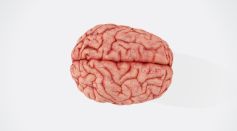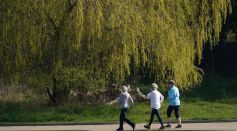Tags: Alzheimer's Disease

High Fat, Sugar Diets Linked to Cognitive Decline and Depression, New Mouse Study Reveals

Neurocognition Associated With Handgrip Strength; Reduced HGS Could Mean Higher Dementia Risk Among Older Adults

Social Isolation Associated With Cognition and Brain Structure

Taking Serine Supplements Increases Risk for Developing Alzheimer's Disease, Study Claims

Smartphone Use Could Cause Alzheimer's Disease Among Young People But Improve Memory of Old Adults With Dementia, Studies Claim

What Do Humans and Monkeys Have In Common? Both Have The Ability to Determine Their Own Depression, Anxiety

Nap Time of Older Adults During Noon Sign of Dementia, Experts Says

Memory Disorders Treatment for Alzheimer’s Disease, Dementia May Be Possible Soon After Brain Cells Study

Early Dementia Reversal Possible Through Active Social Life, Research Suggests

Why Are Women More Likely to Develop Alzheimer’s Disease? Here’s What a New Study of Female Mice Reveals

Thinning of the Retina Could be an Early Sign of Cognitive Decline, Study Suggests

Immersive Virtual Shopping A Potential Solution to Cognitive Assessment, Study Says

Physical Exercise Can Help Adults Fight Dementia-Related Conditions, Study Says

Men vs. Women Brains: Study Finds 1,000 Genes Are More Active in One Gender Than the Other

Why Forgetting Is Not Really a Bad Thing? Here's What Neuroscientists Say

Is Olive Oil An Elixir of Life? Mediterranean Diet Staple Promotes Longevity, Reduces Risks of Alzheimer's and Heart Diseases

Alzheimer's Disease Treatment, Diagnoses Could Be More Precise With Breakthrough Discovery Between Cognitive Decline and Misshapen Tau Proteins

Eating Process of Cells Observed for the First Time; Vesicles and Other Functions Proven Through High-Definition Imaging

More Than 100 Memory-Sensitive Neurons Identified as First Human Evidence of Memory Formation

Sildenafil Identified as a Candidate Drug Against Alzheimer's Disease: Lab Experiments Showed Viagra Reduced Risk of Dementia
Most Popular

Mysterious Structures Discovered Beneath the Pacific Ocean, Puzzle Scientists

Largest Known Volcanic Aquifer Discovered Beneath Oregon's Cascades

New 'Supergiant' Sea Bug Found in South China Sea, Named After Darth Vader

Mediterranean Sea Was Refilled by a Catastrophic Flood Millions of Years Ago





